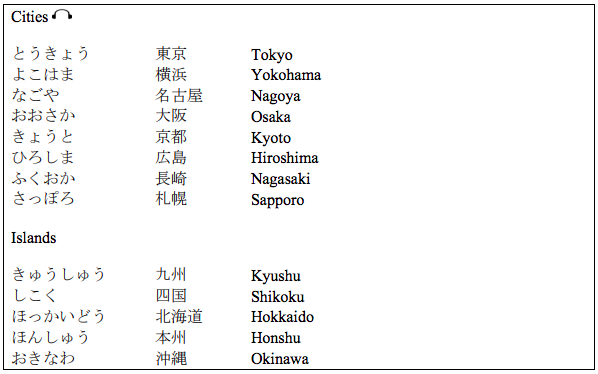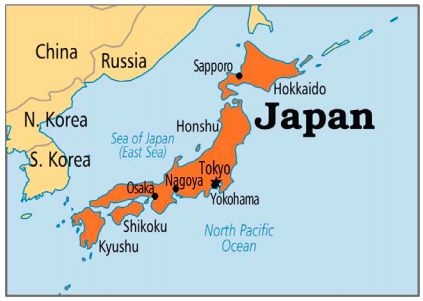2.2: Dialogue 2
- Page ID
- 31512
Michael: Otaku wa dochira desu ka. Where is your house?
お宅 たく はどちらですか。
Honda: Yokohama desu. It’s in Yokohama.
横浜 よこはま です。
Michael: Tsuugaku wa densha desu ka. Do you commute by train?
通学 つうがく は電車 でんしゃ ですか。
Honda: Ee, uchi kara daigaku made densha de ichi-jikan gurai kakarimasu. Yes, from home to university it takes about an hour by train.
ええ、うちから大学 だいがく まで、電車 でんしゃ で 一時間 いちじかん ぐらいかかります。
Michael: Sore wa taihen desu nee. That must be hard. それは大変 たいへん ですねえ。
Vocabulary
otaku おたく お宅 home (polite)
+shusshin しゅっしん 出身 hometown, birthplace, where from
yokohama よこはま 横浜 Yokohama
tsuugaku つうがく 通学 commute to school (noun)
+tsuukin つうきん 通勤 commute to work (noun)
densha でんしゃ 電車 train
+chikatetsu ちかてつ 地下鉄 subway
+basu バス bus
+kuruma くるま 車 car
+jitensha じてんしゃ 自転車 bicycle
+takushii タクシー taxi
+toho とほ 徒歩 walk (noun)
+hikouki ひこうき 飛行機 airplane
+shinkansen しんかんせん 新幹線 bullet train
+fune ふね 船 boat
uchi うち 内、家 home, house
kara から particle: from
made まで particle: as far as, up to
de で particle: by means of
densha でんしゃで 電車で by train
~jikan 〜じかん 時間 ~hours
ichi-jikan いちじかん 一時間 one hour
gurai ぐらい about, approximately
+yaku やく 約 about, approximately
+yaku ichi-jikan やくいちじかん 約一時間 about an hour
+hodo ほど about, as much as
kakarimasu かかります it takes (time, money, etc.)
+nagai ながい 長い long
+mijikai みじかい 短い short


Grammar Notes
Counting Hours
You saw the classifier ~ji for telling time in Lesson 2, as in ichi-ji ‘one o’clock’
and ichi-ji han ‘1:30’. In this lesson, you’ll learn how to COUNT time, i.e., how to
describe length of time. The first classifier of this type is –jikan for counting hours,. It
attaches to the Chinese numerals. Ichi-jikan means one hour and ichi-jikan han means
one and a half hours. The question word for ‘how many hours’ is nan-jikan, while the
question word for ‘what time’ is nan-ji. Also note that jikan alone means time in general.
時間 じかん がありません。Jikan ga arimasen. There is no time.
時間 じかん がかかります。Jikan ga kakarimasu. It takes time.
ちょっと、お時間 じかん 、いいですか Chotto, ojikan ii desu ka.
Do you have some time (Can I talk to you?)?
Approximation: ~ぐらい、〜ほど、約〜
~gurai, ~hodo and yaku all mean ‘about’ and indicate an approximate quantity. ~gurai and ~hodo follow the quantity expression while yaku~ precedes it: :
一時間 いちじかん ぐらいあります。 Ichi-jikan gurai arimasu. We have about an hour.
一時間 いちじかん ほどあります。 Ichi-jikan hodo arimasu. We have about an hour.
約一時間 やくいちじかん あります。 Yaku ichi-jikan arimasu. We have about an hour.
一万円 いちまんえん ぐらいかかります。 Ichi-man-en gurai kakarimasu. It costs about ten thousand yen
約一万円 やくいちまんえん かかります。 Yaku ichi-man-en kakarimasu. It costs about ten thousand yen.
You may even hear yaku ichi-jikan gurai or yaku ichi-jikan hodo. It may seem redundant to have approximation expressed twice in the same phrase, but this is common.
Dore grai and dono gurai both ask ‘how long/how much’ and ikura gurai asks how much (money).
会社 かいしゃ まで、どのぐらいかかりますか. Kaisha made dono gurai kakarimasu ka. How long does it take to get to work?
このアパート、いくらぐらいでしょうか. Kono apaato, ikura gurai deshou ka. How much do you suppose this apartment (rent) is?
Approximation, or making things vague, is preferred over being exact and considered more polite in many situations in Japan. This may be because the approximation allows wiggle room. So, when given an approximate number, you are expected to figure out what number is actually meant in each context. Unless it’s critical, Japanese people usually do not request clarification.
the starting point ~kara、the ending point ~made
The particle kara indicates the point from which something starts and the particle まで indicates the limit at which something ends.
三時 さんじ から、会議 かいぎ です。 San-ji kara, kaigi desu. From 3:00, I have a meeting.
先生 せんせい からメールが来 き ました。 Sensei kara meeru ga kimashita. An email came from the teacher.
京都 きょうと まで、いくらですか。 Kyouto made ikura desu ka. How much is it to go to Kyoto?
駅 えき まで、お願 ねが いします。 Eki made onegai-shimasu. To the station, please. (in a taxi).
朝 あさ から晩 ばん まで、仕事 しごと です。 Asa kara ban made shigoto desu. I work from morning till night.
Compare the examples below with time expressions:
三時 さんじ にします。 San-ji ni shimasu. I’ll do it at three.
三時 さんじ からします。 San-ji kara shimasu. I’ll do it from three.
三時 さんじ までします。 San-ji made shimasu. I’ll do it until three.
Compare the examples below with location expressions:
東 京 とうきょう に行い きます。 Toukyou ni ikimasu. I’ll go to Tokyo (I may go to other places as well).
東 京 とうきょう で会議 かいぎ に行い きます。 Toukyou de kaigi ni ikimasu. I’ll go to a meeting in Tokyo.
東 京 とうきょう から行い きます。 Toukyou kara ikimasu. I’ll go from Tokyo.
東 京 とうきょう まで行い きます。 Toukyoumade ikimasu. I’ll go up to Tokyo (but not farther).
The noun plus these particles makes a noun phrase so they can be directly followed by desu and take no to modify another noun.
会議 かいぎ は三時 さんじ から四時 よ じ までです。 Kaigi wa san-ji kara yoji-made desu. The meeting is from three to four.
アメリカからの留学生 りゅうがくせい Amerika kara no ryuugakusei an exchange student from America
銀行 ぎんこう は三時 さんじ までじゃないですか。Ginkou wa san-ji made ja naidesu ka. Isn’t the bank open until three?


